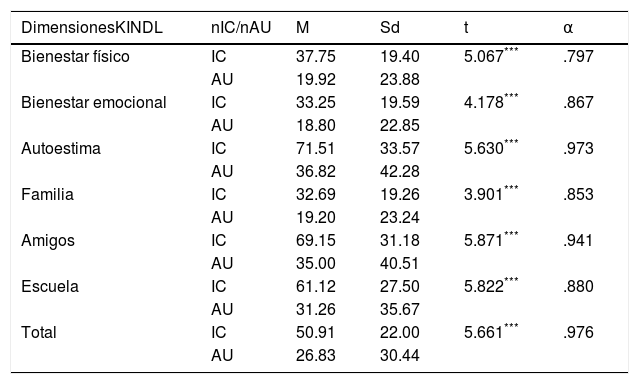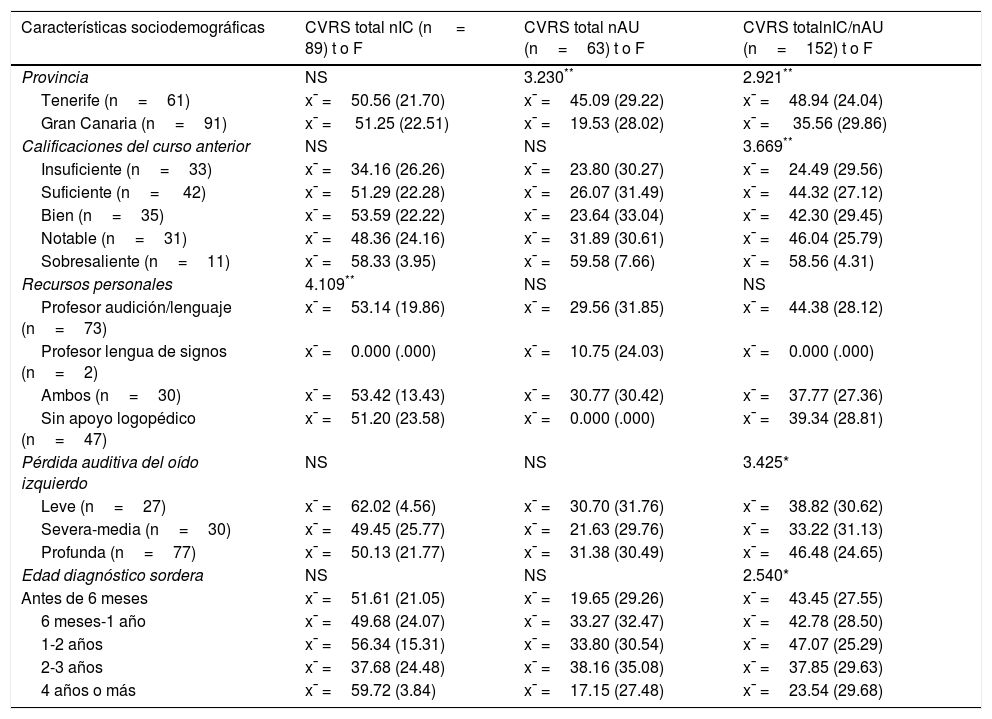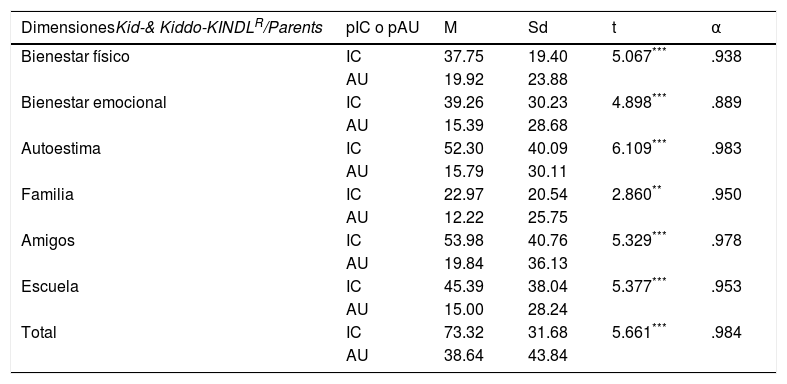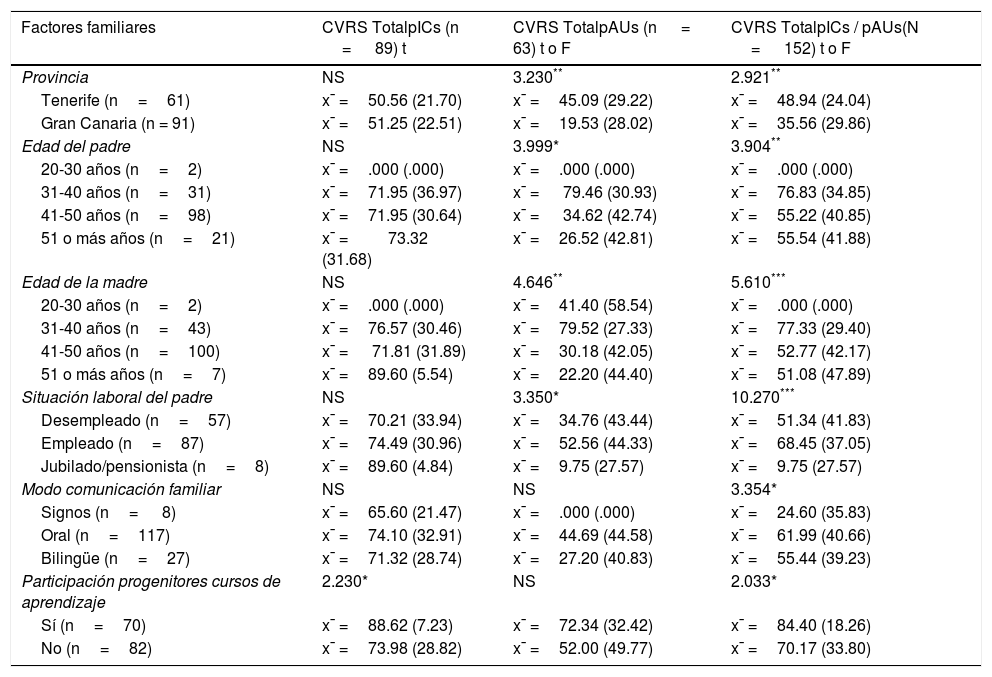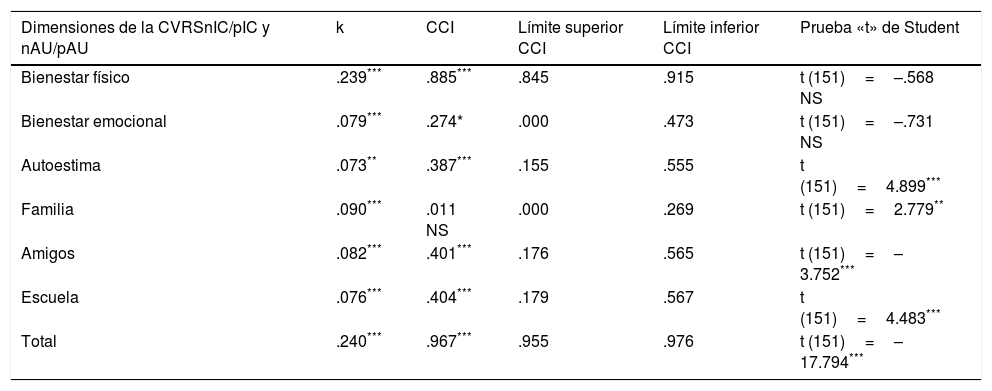Los objetivos del estudio fueron: primero, evaluar la calidad de vida relacionada con la salud (CVRS) de niños y niñas con implantes cocleares (nIC) o audífonos (nAU) de educación primaria de Islas Canarias. Segundo, analizar las percepciones que los progenitores (padres o madres) tenían de la CVRS de los nIC o nAU y finalmente, explorar la homogeneidad de resultados entre los autoinformes de los nIC y nAU y los informes de sus progenitores sobre la CVRS.
Material y métodosSe obtuvieron datos de 89 nIC y 63 nAU y sus 152 progenitores. Se utilizaron 2 instrumentos estandarizados: el Kid-KINDLR_children_7-13, el Kid_Kiddo-KINDLR_Parents_7-17 y un cuestionario con variables demográficas y audiológicas que respondieron nIC y nAU y sus progenitores. Mediante la prueba «t» de Student, ANOVA de una vía, análisis post hoc y 3 coeficientes de correlación de concordancia (CCC) se analizaron los 3 objetivos.
Resultados y discusiónLos nIC mostraron una percepción de mejor CVRS en comparación con los nAU. Los nIC y nAU y sus padres fueron significativamente distintos en las provincias de Tenerife y Gran Canaria. Los nIC y nAU de Gran Canaria obtuvieron mejores resultados en las dimensiones bienestar emocional y familiar, mientras que los nIC y nAU de Tenerife destacaron en autoestima o amigos. Los progenitores de los niños con IC (pIC) tuvieron una puntuación promedio más alta en la percepción de la CVRS total y por dimensiones referida a sus hijos frente a los progenitores de los nAU. El acuerdo entre niños y sus progenitores fue bajo, excepto en la dimensión autoestima. Los nIC y sus progenitores percibieron mejor CVRS que los nAU y sus progenitores. Las autopercepciones de los nIC y nAU de la CVRS fueron inferiores a las informadas por sus progenitores.
ConclusionesLos hallazgos sugieren que los nIC y nAU de educación primaria de las Islas Canarias han mantenido percepciones discrepantes de su CVRS, autopercibiendo los nIC mejor CVRS que los nAU. Los pIC han alcanzado una puntuación promedio más alta de la CVRS de sus hijos que la expresada por los progenitores de nAU por razones de pertenencia a una provincia. Los profesionales que trabajan con los nIC y nAU deben optimizar las dimensiones de la CVRS de los nIC y nAU.
The objectives of the study were first, to evaluate the health-related quality of life (HRQoL) of primary school children from the Canary Islands with cochlear implants (CIs) and hearing aids (HAs). And second, to analyse parents’ perceptions of their children with CIs and HAs regarding HRQoL, and finally, to explore the agreement between the children's self-reports and their parents’ reports concerning HRQoL.
Material and methodsData consisted of 89 children with CIs and 63 children with HAs and their 152 parents. Two standardised instruments were used: Kid-KINDLR_children_7-13, Kid_Kiddo-KINDLR_Parents_ 7-17 and a demographic and audiological survey, which were answered by the children and their parents. Student's t-test, one-way ANOVA, post hoc analysis and 3 concordance correlation coefficients (CCC) were used to address the 3 objectives.
Results and discussionThe children with CIs exhibited a perception of better HRQoL in comparison with the children with HAs. The children with CIs and HAs and their parents were significantly distinct in the provinces of Tenerife and Gran Canaria. The cchildren with CIs and HAs from Gran Canaria were better on Emotional well-being and Family, while the children with CIs and HAs from Tenerife emphasised Self-esteem or Friends. The parents of the children with CIs had a higher average score in the perception of the total HRQoL and per dimension related to their children compared to the parents of the children with HAs. The agreement between children and parents was low except in the Self-esteem dimension. The children with CIs and their parents demonstrated a perception of better HRQoL than the children with HAs and their parents. The children with CIs and HAs had lower self-perception of the HRQoL than their parents’ reports.
ConclusionsThe findings suggest that the children with CIs and HAs in Primary Education in the Canary Islands have discrepant perceptions of their HRQoL; the children with CIs self-perceive better HRQoL than the children with HAs. The parents of the children with CIs achieved a higher average score of their children's HRQoL than the parents of the children with HAs due to their belonging to a province. Professionals working with CI and HA recipients need to be sensitive to psychological issues to optimise HRQoL dimensions in children with CIs and HAs.
Artículo
Comprando el artículo el PDF del mismo podrá ser descargado
Precio 19,34 €
Comprar ahora






